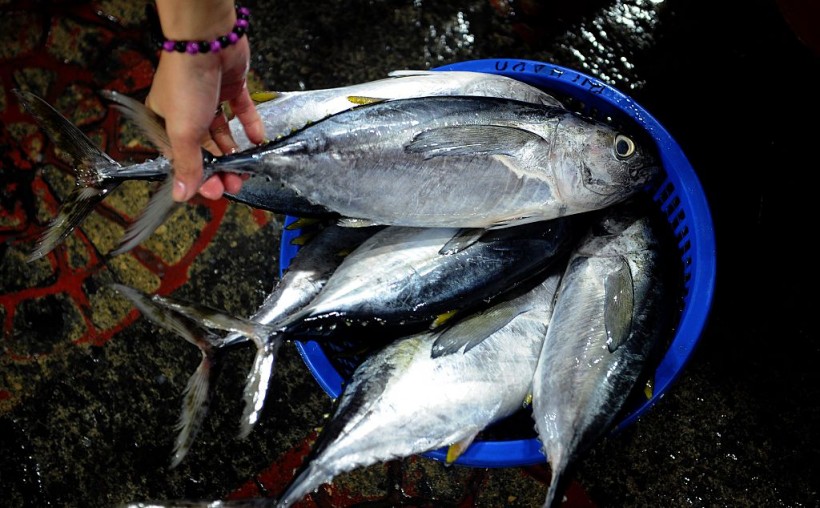The Indian Ocean, known for its rich biodiversity and abundant marine life, is facing an unprecedented crisis. The yellowfin tuna, a species integral to the ecosystem and a popular choice for sashimi and poke bowls globally, is witnessing a sharp decline in population.
A recent study published in Ocean and Coastal Management reveals alarming statistics that could potentially lead to catastrophic consequences not just for the marine ecosystem but also for coastal communities dependent on fishing.
Overfishing: The Primary Culprit
 (Photo : JAY DIRECTO/AFP via Getty Images)
(Photo : JAY DIRECTO/AFP via Getty Images)

Overfishing has been identified as the primary culprit. Industrial exploitation since 1950 has led to a staggering 70% decline in biomass of yellowfin tuna populations managed by Regional Fisheries Management Organizations (RFMO) in the Indian Ocean.
This overexploitation threatens not only the balance of life underwater but also impacts millions who rely on these waters for livelihood and sustenance.
According to the study, the current fishing pressure is unsustainable and exceeds the maximum sustainable yield (MSY) by 28%.
This means that the fish are being harvested faster than they can reproduce, resulting in a depletion of the stock. The study also warns that if the current trend continues, the yellowfin tuna population could collapse by 2026.
The study's lead author, Dr. Maria Lourdes Palomares, a senior scientist at the Sea Around Us initiative at the University of British Columbia, said that the situation is dire and requires urgent action.
"The Indian Ocean yellowfin tuna are in a critical state. They are overfished and overfishing is still ongoing. We need to reduce the fishing mortality by at least 40% to prevent further declines and ensure the long-term sustainability of this resource," she said.
Also Read: Bluefin Tuna Internal Temperature Study Reveals Feeding and Migration Patterns
The Global Response: A Call for Collective Action
As international alarm bells ring, efforts are being intensified to mitigate this crisis. Conservationists, scientists, and policymakers are rallying together to implement stringent measures aimed at curbing overfishing and promoting sustainable fishing practices.
The global community's response will be pivotal in determining the future of yellowfin tuna in these waters. It underscores an urgent need for collective action that transcends national boundaries and prioritizes ecological preservation over short-term gains.
One of the key steps is to strengthen the role and effectiveness of the Indian Ocean Tuna Commission (IOTC), the intergovernmental organization responsible for the management of tuna and tuna-like species in the Indian Ocean.
The IOTC has been criticized for its lack of transparency, accountability, and enforcement, as well as its failure to adopt science-based catch limits and quotas.
Another important step is to increase the involvement and participation of small-scale fishers and coastal communities in the decision-making process.
These groups are often marginalized and excluded from the benefits of the tuna industry, despite being the most affected by its impacts. They also have valuable local knowledge and experience that can contribute to the conservation and management of the resource.
Furthermore, there is a need to raise awareness and educate consumers about the origin and sustainability of the tuna products they consume.
By choosing tuna that is certified by credible eco-labels, such as the Marine Stewardship Council (MSC), consumers can support responsible fishing practices and reduce the demand for overexploited tuna.
The yellowfin tuna crisis is a wake-up call for the world to act now and save this vital species before it is too late. As Dr. Palomares said,"The Indian Ocean yellowfin tuna is not only a food source, but also a symbol of the health and resilience of the ocean. We cannot afford to lose it."
Related article: How Tuna Stay Alive in Heart-Stopping Cold
© 2024 NatureWorldNews.com All rights reserved. Do not reproduce without permission.

![Tsunami Hazard Zones: New US Map Shows Places at Risk of Flooding and Tsunamis Amid Rising Sea Levels [NOAA]](https://1471793142.rsc.cdn77.org/data/thumbs/full/70325/280/157/50/40/tsunami-hazard-zones-new-us-map-shows-places-at-risk-of-flooding-and-tsunamis-amid-rising-sea-levels-noaa.jpg)



